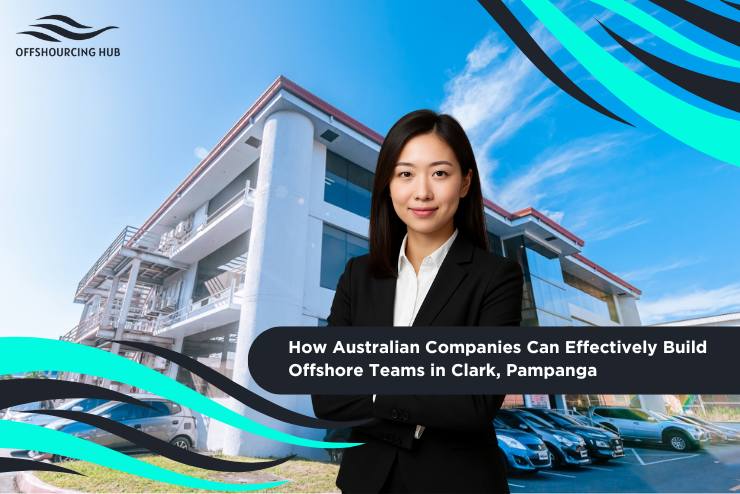How Australian Companies Can Effectively Build Offshore Teams in Clark, Pampanga
- Sebastian Elliot Osborne

- Aug 29, 2025
- 6 min read

Over the past decade, Clark, Pampanga has quietly grown into one of the Philippines’ most reliable destinations for offshoring. Once known mainly as a former US airbase, it’s now home to international companies that rely on its skilled workforce, modern business parks, and strong government support for outsourcing. For Australian businesses, Clark offers something rare: a location that combines cost efficiency with professional talent and a time zone that aligns closely with Sydney and Melbourne.
But success in offshoring isn’t guaranteed. Companies that rush into it without a plan often struggle with mismatched hires, unclear structures, or communication breakdowns. That’s why having a clear offshore business strategy is essential. Building the right offshore team is not only about saving on costs — it’s about creating a foundation that supports growth, protects quality, and keeps operations running smoothly for the long term.
I’ve spent the last four years writing about digital marketing and global staffing, and more recently, I’ve focused on helping Australian businesses understand the opportunities in the Philippines. Working closely with providers in Clark has given me a clear view of both the challenges and the practical steps that lead to success.
This article draws on that experience. It will show you how to build an offshore team in Clark, step by step — from setting goals and choosing a provider to managing performance and engagement. Whether you’re exploring offshoring for the first time or looking to improve your current setup, these insights will help you build a team that strengthens your business today and in the years ahead.
Why Clark, Pampanga is a Strategic Choice

Clark sits only a short flight away from Australia and shares a time zone that overlaps comfortably with working hours back home. That means real-time collaboration without the fatigue of working odd shifts. For businesses managing client calls, tech support, or back-office functions, that overlap translates into faster responses and smoother daily operations.
The Philippines also produces thousands of university graduates every year across IT, finance, marketing, and health sciences. Many Filipinos are fluent in English and are familiar with Australian culture thanks to media, education, and years of shared business ties. This makes training easier and reduces the friction that companies sometimes face when managing teams overseas. Partnering with an offshoring company in Clark Pampanga Philippines gives Australian businesses the advantage of tapping into this highly skilled workforce with the guidance of experienced providers who understand both local and international business needs.
Infrastructure is another major draw. Clark has been developed as a special economic zone, offering modern office spaces, reliable internet connectivity, and consistent utilities. For a business leader, this removes concerns about disruptions that could derail operations.
Step-by-Step Guide to Building Offshore Teams

Step 1: Define Offshore Goals
Every offshore strategy begins with clarity. Ask: which parts of the business need support, and why? Some companies choose customer service to reduce labour costs. Others expand IT or digital marketing teams to access specific expertise.
The impact of this decision is straightforward. For example, the International Trade Administration reports that offshoring can cut staffing expenses by as much as 60 per cent. For an Australian company, that isn’t just a number — it’s the ability to reinvest in technology upgrades, expand sales teams, or improve training programs without stretching budgets thin.
Step 2: Select the Right Offshore Partner in Clark
Choosing a partner is one of the most important decisions in the process. Some businesses work with traditional BPOs, which manage entire functions. Others prefer staff leasing, where the provider recruits and houses the employees but the client directs their daily work. Managed services fall somewhere in between, offering more oversight on systems and processes.
The right choice depends on your goals. A provider with a solid track record, strong compliance standards, and recruitment expertise will ensure that you aren’t spending months fixing mismatches or dealing with turnover. In Clark, competition among providers means you can find one that fits both your budget and growth plans.
Step 3: Establish Team Structure
An offshore team functions best when roles and responsibilities are clear from the start. Write precise job descriptions and agree on reporting lines before recruitment begins. This avoids confusion later and ensures everyone understands how their work connects to the company’s overall objectives.
Clarity here pays off. Employees who know what’s expected of them settle into their roles faster, and managers in Australia spend less time resolving misunderstandings.
Step 4: Recruitment and Onboarding
One of the advantages of working with a Clark-based provider is access to a broad talent pool. They handle sourcing, shortlisting, and initial screening, saving you the time and expense of running international recruitment campaigns.
Onboarding matters just as much as recruitment. Staff who are properly introduced to company culture and processes are more likely to stay. High turnover is costly and disruptive, so investing in a thoughtful onboarding program protects both morale and the bottom line.
Step 5: Communication and Collaboration Tools
Distance only becomes a barrier if communication is inconsistent. Tools like Microsoft Teams, Slack, and project management platforms allow teams in Clark to work alongside their Australian counterparts as if they were in the same office. What matters most is agreeing on how those tools are used: when to send daily updates, how often to schedule check-ins, and who needs to be looped into specific conversations.
When expectations are clear, offshore staff feel included, and managers can focus on outcomes rather than chasing updates.
Step 6: Performance Management and Engagement
Setting measurable outcomes allows both sides to see progress in concrete terms. These might include customer satisfaction ratings, turnaround times, or campaign results. What matters is that the metrics reflect the priorities of the business.
Engagement is equally important. Offshore staff should feel like part of the company, not a separate unit. Regular recognition, inclusion in company meetings, and consistent feedback go a long way towards building trust and long-term commitment.
Overcoming Common Challenges

Managing Cultural Differences
Australian companies sometimes hesitate to offshore because of concerns about cultural differences. In practice, those differences are usually minor and can even add value. Filipinos are known for their adaptability and strong English skills, which makes collaboration much easier than many expect. What matters most is communication. Take the time to explain your company’s work style and encourage open dialogue so offshore staff feel comfortable asking questions. This approach builds mutual respect and prevents misunderstandings before they grow into bigger issues.
Maintaining Quality Control
One of the early worries for many businesses is how to maintain quality without being in the same office. The answer lies in clarity. Set measurable standards from the beginning and review them regularly. This creates accountability without the need to micromanage. Many providers in Clark also support their clients with monitoring tools and reports that give visibility into performance. In fact, quality assurance offshoring in the Philippines has become a strong advantage for Australian companies, as providers are equipped with structured processes and experienced teams that ensure standards are consistently met. When expectations are clear and consistent, offshore staff know what’s required, and managers can focus on results instead of daily corrections.
Building Trust and Accountability Across Borders
Trust doesn’t develop overnight, but it can grow quickly with transparency. Regular updates, honest feedback, and shared wins help Australian managers feel confident that work is being handled properly. At the same time, offshore staff gain reassurance that their contributions are recognised. Accountability becomes natural when both sides know what to expect and see proof of progress. Over time, this trust creates a strong working relationship that functions as smoothly as if everyone were under the same roof.
Your Offshourcing Advice

Clark, Pampanga has become one of the Philippines’ strongest locations for offshoring. Its skilled workforce, reliable infrastructure, and cultural compatibility make it a natural fit for Australian companies seeking to grow while managing costs responsibly.
Success depends on having a clear strategy and the right foundations. Conducting an offshore team assessment ensures you identify the right skills, roles, and structures before scaling. Define your goals, select a partner you can trust, build a strong team framework, and put communication and engagement at the centre of your operations. With these steps in place, offshore teams in Clark can help Australian companies reduce costs while strengthening their overall business performance for years to come.





Comments